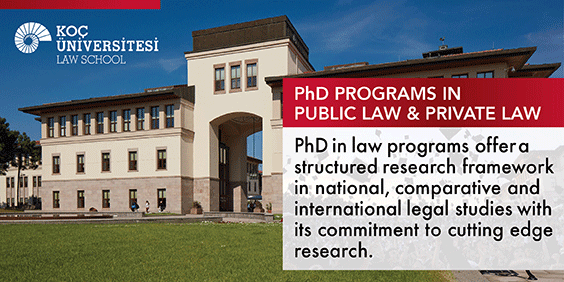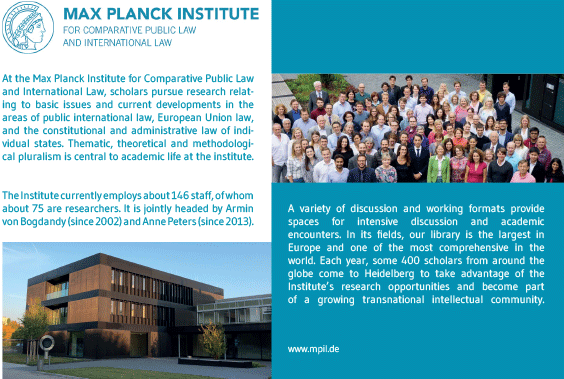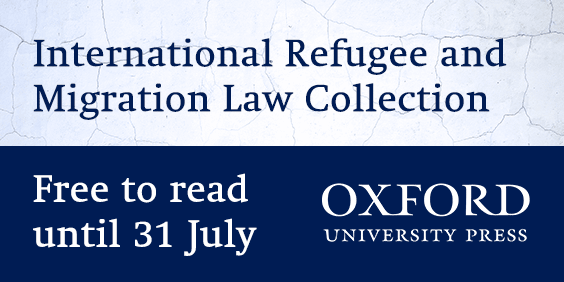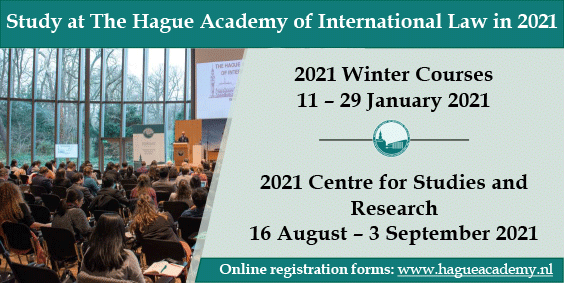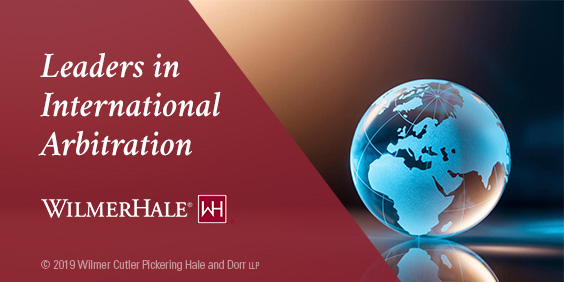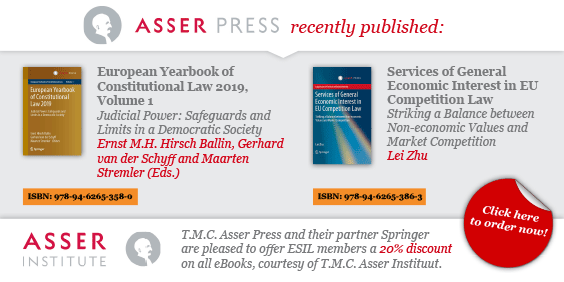Newsletter SEDI Juin 2020
Editrice: Sandrine Maljean-Dubois (University of Aix-Marseille)
 Dans ce numéro
Dans ce numéro
- Message du Président
- Nouvelles du Secrétaire Général
- Éditorial de l’invité par Lavanya Rajamani: La lutte contre le changement climatique dans le monde après la COVID-19
- Forum de la Recherche de la SEDI 2021
- Conférence Annuelle de la SEDI 2021
- ESIL SSRN Series
- ESIL Reflections
- Nouvelles des Groupes de Réflexion
1. Message du Président

Photini Pazartzis
As this issue of the ESIL Newsletter was going to press, protests across the world, in the wake of the tragic events in Minneapolis, dominated the news. We, as individuals and international lawyers, are closely following the debates and the reactions by colleagues here, by independent experts of the Special Procedures of the United Nations Human Rights Council here, and most recently, the scholarly debate initiated in a Symposium launched by our colleagues at Ejiltalk.
Most certainly, this discussion will continue, and as it directly touches on international law, so it involves all of us. In this sense, we had a lengthy discussion within the ESIL Board as to whether and how our Society, as a community of international/European scholars, should react. This is part of a recurrent debate on the role of international scholarly societies, which has been the object of discussion on various occasions, both within ESIL, and in other societies of which many of us are also members. Now is not the time to launch a general discussion on how to separate politics from law, a perennial discussion, from Lauterpacht’s The Function of Law in the International Community to, -for the sake of linguistic diversity-, de Visscher’s Théories et realités du droit international public.
Despite differing views, as international lawyers, we felt compelled to acknowledge the debate in Europe and across the world on racial violence, human rights, and justice, which are issues of universal concern. We also wanted, as a Society, to reaffirm our standing commitment to the promotion of the rule of law, human rights, equality and non-discrimination both within and outside our community. I hope that the Society, through its work, will continue to engage in topical debates on issues of international law.
Photini Pazartzis
ESIL President
2. Nouvelles du Secrétaire Général

In normal times, we would now be buying plane tickets and making hotel bookings for the 16th ESIL Annual Conference that was due to take place in September 2020 in Stockholm. We would also be getting ready for various ESIL joint events and ESIL-supported events that were planned for these months.
Unfortunately, we are not living in normal times. As you have all certainly noticed, over the past couple of weeks, the ESIL Board, acting in cooperation with local organizers, has had to take the difficult decision to postpone most of the ESIL events scheduled for 2020. These include the ESIL Research Forum (Catania, April 2020) and the ESIL Annual Conference (Stockholm, September 2020). The Board sincerely regrets that there will be no opportunity to gather and discuss topical issues of international law – and the current crisis itself certainly provides a lot of such topics – in the coming months. Yet, health concerns and consideration for local organizers, who can hardly be expected to engage in preparatory work in the current atmosphere of uncertainty, have had to prevail. We are confident that ESIL members will understand the situation and endorse our decisions.
However, none of the ESIL events planned for this year has been completely cancelled. We have already set new dates for our main annual events: the Research Forum, on ‘Solidarity: The Quest for Founding Utopias of International Law’, is planned for 15-16 April 2021 (Catania). The 16th ESIL Annual Conference, on ‘Changes in International Lawmaking: Actors, Processes, Impact‘, will take place on 9-11 September 2021 (Stockholm). The programmes of these two events have already been set up and will be left untouched to the extent possible. For ESIL joint events and ESIL-supported events, the Board will be in touch with local organizers to determine new dates, and possibly new modalities (video-conferences, etc.). Updated information can be found, as always, on the ESIL website and in the monthly ESIL Updates.
Some events, especially the smaller-scale ones, might be held through alternative means (Zoom or Skype meetings, webinars, etc.). The Board has been working on a new ESIL Carbon Footprint strategy for some time, intending to actively encourage a broader use of alternative means of communication within the Society and its interest groups. The current crisis has forced many of us to explore such alternatives for teaching, holding meetings, communicating with our students or colleagues. We hope to capitalise on these newly acquired skills within ESIL. While online communication will not, and cannot, completely replace real-life meetings, it can be a helpful complement to make the Society, at the same time, better prepared for times of crises and more environmental-friendly.
The Board, using new ways of communication will hold the ESIL General Assembly on Friday 11 September 2020, as planned (15-17 CET). The General Assembly is the only body within ESIL competent to approve the Annual Report and the Audit Report. This year, moreover, the mandate of seven members of the ESIL Board will expire and it is, again, the General Assembly, which has to elect new Board members. After a thorough discussion of alternative options, the Board has decided to proceed with the elections according to the original schedule. The elections will take place by means of electronic voting, after the ESIL General Assembly (which will be held by Zoom). All ESIL members will be invited to register to attend the GA and/or vote in the Board elections.
You will receive more detailed information about the GA and the elections in the near future. We hope that online communication will make the process more inclusive and accessible to all members of the Society.
Allow us to wish you, on behalf of the ESIL Board, good health, strong nerves and a (large) dose of patience. All crises, including the one we are currently facing, bring new challenges and new opportunities. Let’s hope that each of us individually, as well as all of us in ESIL collectively, will be able to withstand the former and make the best use of the latter.
Veronika Bílková
ESIL Secretary-General
3. Éditorial de l’invité – La lutte contre le changement climatique dans le monde après la COVID-19

Lavanya Rajamani
La crise du coronavirus a profondément changé la façon dont nous vivons, travaillons, et interagissons avec les autres. Alors que certains espèrent un retour à la normale, il est de plus en plus clair que la ‘nouvelle normalité’ sera différente de celle d’avant la COVID 19. Ceci est évident s’agissant du droit et des politiques internationales relatives aux changements climatiques.
Le ‘lockdown’ mondial des derniers mois, avec le confinement des personnes à domicile et la mise à l’arrêt des entreprises, a généré une baisse spectaculaire de la demande d’énergie et des émissions de CO2. Dans un article récent du journal Nature, des chercheurs ont estimé que les émissions journalières de CO2 ont diminué de 17 % en avril, et que les émissions annuelles de 2020 sont susceptibles d’être réduites de 4 à 7 %. Bien qu’à première vue cela représente une lueur d’espoir dans les nuages de la COVID, dans l’ensemble la crise du coronavirus est susceptible de freiner de manière sérieuse (et potentiellement fatale) les efforts mondiaux de lutte contre le changement climatique.
La réduction des émissions en 2020, due aux mesures drastiques du confinement et non à des changements structurels dans les secteurs de l’économie, du transport, de l’énergie ou de l’agriculture, est probablement temporaire. Entre-temps, les engagements, les actions, les politiques et les mesures qui visent à limiter les émissions de gaz à effet de serre ‘nettement en dessous de 2°C’, deviennent de plus en plus hors de portée.
Jusqu’à présent, les contributions déterminées au niveau national (CDNs) soumises dans le cadre de l’Accord de Paris en 2015 nous placent sur une trajectoire conduisant à une augmentation de la température de 3,2°C d’ici la fin du siècle. Le manque d’ambition initial doit être comblé tous les cinq ans par des CDNs de plus en plus ambitieuses à partir de 2020. Jusqu’à présent, seulement sept États, représentant une fraction insignifiante des émissions à l’échelle globale, ont révisé leurs CDNs. Même si le délai de mise à jour des CDNs est fixé à 2020 et non à la Conférence annuelle des Parties (COP 26), le report de cette conférence d’une année entière aura des conséquences importantes. Les conférences annuelles sur le climat, un moment d’attention populaire et médiatique accrue, d’action directe de la société civile, d’interventions des chefs d’États et d’influences mutuelles entre États, sont un outil fondamental pour pousser ces derniers à agir et s’engager. Le report de la COP 26, bien qu’inévitable, affectera le rythme de mise à jour des CDNs, ce que nous ne pouvons nous permettre au regard de l’étroite fenêtre d’opportunité qui se referme rapidement pour éviter un changement climatique dangereux. En outre, la crise du coronavirus a fondamentalement changé le contexte politique, social et économique dans lequel les CDNs seront désormais formulées. Alors que les États peinent à se remettre de la crise économique générée par le confinement, la volonté d’alléger les charges réglementaires sur les entreprises, de renégocier les accords de libre-échange et de réorienter les dépenses consacrées au changement climatique sera forte. Les États doivent résister à cette tentation.
Les températures du mois de mai, les plus chaudes jamais enregistrées, nous rappellent les dangers très réels du réchauffement climatique. La crise du coronavirus a brutalement démontré que les bouleversements, sanitaires et climatiques compris, affectent largement les populations plus pauvres et vulnérables. Alors que les États émergent de l’ombre de la COVID, il est impératif d’agir avec vision pour garantir une reprise écologique et équitable, une reprise qui donne priorité à la décarbonisation et à la résilience climatique et qui prenne en compte les besoins des plus pauvres et des plus vulnérables, en première ligne s’agissant des impacts climatiques comme de la COVID.
4. Forum de la Recherche de la SEDI 2021
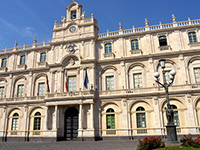
The University of Catania, Department of Law, will host the ESIL Research Forum ‘Solidarity: The Quest for Founding Utopias of International Law’. The Catania ESIL Research Forum aims at inspiring thoughtful reflections on the genealogy of international solidarity by focusing on the actors, norms and processes influencing its evolution over time.
Due to Covid-19 crisis, the ESIL Board and the ESIL Research Forum Committee have decided to postpone the upcoming event, which was due to take place in October 2020. The event will be held on Thursday April 15 and Friday 16 2021. The programme will remain as planned, subject to further confirmation of availability by the panelists.
All speakers and Interest Groups will be updated shortly.
Organizers will keep all registered participants informed on the updated schedule of the Research Forum.
For assistance and information please visit the conference website or contact the local secretariat: 2020esil.rf.catania@lex.unict.it
5. Conférence Annuelle de la SEDI 2021

The 16th annual conference will be held 9-11 September 2021, with pre-conference workshops on 8 September. The programme and the venue will be the same as planned for 2020; see our website for more information. All speakers for 2020 have been invited for 2021, and we thank them for their positive responses.
6. ESIL SSRN Series

The SSRN Papers from the 2019 Annual Conference in Athens (‘Sovereignty: A concept in flux?’) are now available online.
The ESIL SSRN Paper Series features papers presented at ESIL Events (Annual Conferences, Research Forums, and Interest Groups events). Publication in the ESIL Series enables authors to disseminate their work widely and reach broader audiences without the usual delays involved in more traditional means of publication. The current SSRN Series editors are Gleider Hernandez and Sandrine Maljean-Dubois. For further information or in case of enquiries please contact: esil.ssrn@gmail.com and gleider.hernandez@kuleuven.be or s.maljean-dubois@univ-amu.fr
7. ESIL Reflections

ESIL Reflections are short papers published on the website of the European Society of International Law (ESIL). ESIL Reflections offer up-to-date reflections on current issues in international law. The Reflections are now in their sixth year, covering a wide range of topics relating to current developments in international law and practice as well as theoretical reflections in a way that is relatively accessible to non-experts. The aim is to foster discussion between ESIL members and international law scholars and practitioners more generally – in Europe, but also beyond. ESIL Reflections are published online and distributed freely to ESIL members.
The editors are Federico Casolari, Patrycja Grzebyk, Ellen Hey, Guy Sinclair and Ramses Wessel (editor-in-chief).
ESIL Reflections are short papers (3000-4000 words) that argue one particular point that may trigger further debate in the scientific community. Extensive referencing is to be avoided. References are only necessary in case of direct citations or when new or less well-known works are mentioned.
Latest publications are:
- States’ Resilience to Future Health Emergencies – Connecting the Dots between Core Obligations and Core Capacities by Brigit Toebes
- Due Diligence and Extraterritorial Human Rights Obligations – Mind the Gap! by Samantha Besson
8. Nouvelles des Groupes de Réflexion
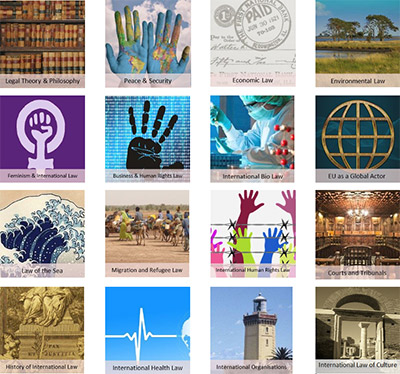
ESIL Interest Groups are a vital part of the Society’s success and activities. A list of the groups is available on the ESIL website. Reports of recent activities and upcoming events are available in the full text of the Newsletter.
Interest Group on International Law of Culture
As our IG looks forward to its postponed event at the ESIL Research Workshop in Catania, we will begin an outreach initiative to our members seeking ideas for further events and proposals for the postponed ESIL Annual Meeting in Stockholm next year. In the meantime, please continue to follow our blog for updates and developments in the field at http://esilhil.blogspot.com/
